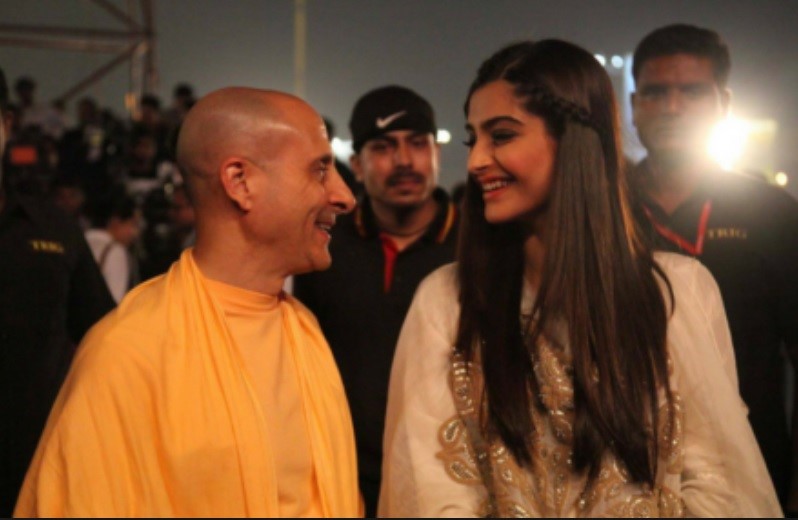The Radhanatha Gita:
With the American Swami on the Battlefield of Life

The American Swami fighting on the battlefield of life
In The Journey Home, page 183, Radhanatha Swami describes his visit to Kurukshetra. He writes, “The Gita had been spoken on a battlefield because life itself is a battle, where evil perpetually attacks good and our sacred ideals are destined to be tested … Krishna’s timeless call culminated in the practice of selfless devotion, determination and spiritual absorption as a means to access a power beyond our own to overcome all fear—the power of God’s love.”
Well, well, well—that’s all fine and dandy, isn’t it. At least for a spiritually weak person at first glance this corny song and dance might sort of fit, as dubious as it is. But with that talk of “absorption” some red flags begin to go up. And there’s more to come. In fact, this is the sort of deliberately ambiguous explanation of Shri Krishna’s message commonly delivered by Mayavadis with their bald-face twisting of the truth. By saying, “Krishna’s timeless call culminates in the power of God’s love,” it adulterates the mind of the hearer. In the mind it separates the Supreme Lord Shri Krishna from actually being God to His speaking about some undefined God who is different from Him and yet who like some vacuum cleaner is ready to absorb us into some eternal light.
Yes indeed, this pious sounding claptrap is Mayavada, pure and simple. Rather than establishing devotion to our Lord Shri Krishna, such duplicitous and devious “word jugglery”—as Shrila Prabhupada called it—subtly, gradually and insidiously erodes the devotee’s Krishna consciousness.
As the Founder-Acharya of ISKCON repeatedly reminded us, “Lord Caitanya Mahāprabhu has warned that no description of the pastimes of the Lord should be heard from the Māyāvāda, or impersonalist, school. He has clearly said, māyāvādi-bhāṣya śunile haya sarva nāśa:if anyone hears the Māyāvādīs’ interpretation of the pastimes of the Lord, or their interpretation of Bhagavad-gītā, Śrīmad-Bhāgavatam or any other Vedic literature, then he is doomed. Once one is associated with impersonalists, he can never understand the personal feature of the Lord and His transcendental pastimes.” (Shrimad-Bhagavatam 3.19.33, Bhaktivedanta Purport)
This sort of tired and threadbare preaching that we hear from the American Swami in Kurukshetra is nothing new—it is extremely common in India. It is not necessary to look for it from some self-absorbed American swami. Such pseudo-wisdom is repeated by every wise-sounding yet clueless Hindu uncle from his bedroom rocking chair. Although such contrivances might even sound reasonable to a less philosophically-inclined person, upon examining the treachery of the double meanings, we can see that this dubious philosophy fits better in the Radhanatha Gita than the actual Bhagavad-gita of Bhagavan Lord Shri Krishna.
For anyone who has lost his direction in the hypnotic lullaby of impersonalism due to having been duped into reading The Journey Home and suchlike swami literatures, let us remind you again that Lord Shri Krishna is indeed the Supreme Personality of Godhead—eternally. The Bhagavad-gita contains His instructions to Arjuna and to the world for surrendering unto Him in an attitude of pure and loving devotional service. That is the actual message of Bhagavad-gita. There is no separation of Krishna and God. Krishna is God. That is why Krishna can tell Arjuna—and us:
“Always think of Me and become My devotee. Worship Me and offer your homage unto Me. Thus you will come to Me without fail. I promise you this because you are My very dear friend.” (Bg 18.65)
When we are confronted by the impersonal balderdash of pretentious yogis and swamis, there are a few fatal questions we can ask to nail down the Mayavadi Questions like, “Well if Krishna is preaching about God’s love, then who is Krishna? Is He different from the God whose love he is talking about?” The ultimate Hindu-ized version is that Krishna is a manifestation of the One God who we all are or ultimately can become, and that Krishna has sort of jumped out of the impersonal Brahman to direct us to once again find our position of merging back into the silent void of oneness.
In other words, such preaching that draws a line between a supposed “Krishna” and “God” does not specifically articulate that Lord Shri Krishna is the Supreme Personality of Godhead Who is One without a second. Anyone who actually follows Shrila Prabhupada know that His Divine Grace as a pure devotee of Lord Shri Krishna was always clear that the Battle of Kurukshetra was not some staged event so that people could realize that their goodness is under attack by some fuzzy and obscure evil. If it was simply good versus evil, what was Pitamaha Bhishma, one of the twelve mahajans, doing on the side of the Kauravas? Understanding Bhagavad-gita As It Is takes the guidance of a genuine spiritual master and not a saffron-robed neophyte.
Such watered down preaching as found in The Journey Home has no place in anyone who claims to be in the disciplic succession coming from His Divine Grace A C Bhaktivedanta Swami Prabhupada. For as Krishna informs Arjuna (Bg 10.8):
“I am the source of all spiritual and material worlds. Everything emanates from Me. The wise who know this perfectly engage in My devotional service and worship Me with all their hearts.”
But the Radhanatha Gita gets worse. After his fuzzy misinterpretations, the American Swami goes on to boast, “…the Bhagavad Gita’s message penetrated me so deeply that I felt as if Krishna were (sic) speaking directly to me on each page.” Talk about chutzpah! First the Swami wrangles some hackneyed meanings out of the Gita, and now he thinks the Supreme Lord is so pleased with his Mayavadi bhasya that He has personally comes to speak with him. But, as Prabhupada warns us over and again, such delusion is the fate of one who deliberately goes to associate with orange-robed snakes.

”One who hears the Māyāvādīs’ interpretations is doomed.”
The actual disciple never tries to approach Lord Shri Krishna directly. The sincere servant goes to Krishna, the Supreme Personality of Godhead, through the transparent via media of the merciful spiritual master. Supposedly Radhanatha Swami is an initiate of the Founder-Acharya of the Hare Krishna Movement. Therefore, if he really wants to please the Supreme Lord he should not concoct his own banal ideas about what he calls (on page 184) “one of the most important religions of India … Hindu philosophy.” Rather he should speak Bhagavad-gita As It Is—the way Shrila Prabhupada has taught it.
But perhaps the Bhagavad-gita is far too advanced for those who think that the Battle of Kurukshetra was staged because “life itself is a battle, where evil perpetually attacks good.” It is not meant for deluded personalities who think they can open the Gita and Krishna immediately jumps out to speak to them. Radhanath should study the words of Shrila Prabhupada from his own Introduction https://prabhupadabooks.com/bg/introduction to Bhagavad-gita As It Is:
“The spirit of Bhagavad-gītā is mentioned in Bhagavad-gītā itself. It is just like this: if we want to take a particular medicine, then we have to follow the directions written on the label. We cannot take the medicine according to our own whim or the direction of a friend. It must be taken according to the directions on the label or the directions given by a physician. Similarly, Bhagavad-gītā should be taken or accepted as it is directed by the speaker himself. The speaker of Bhagavad-gītā is Lord Śrī Kṛṣṇa. He is mentioned on every page of Bhagavad-gītā as the Supreme Personality of Godhead, Bhagavān. Of course the word bhagavān’ sometimes refers to any powerful person or any powerful demigod, and certainly here Bhagavān designates Lord Śrī Kṛṣṇa as a great personality, butat the same time we should know that Lord Śrī Krishna is the Supreme Personality of Godhead, as is confirmed by all great acharyas (spiritual masters) like Śaṅkarācārya, Rāmānujācārya, Madhvācārya, Nimbārka Svāmī, Śrī Caitanya Mahāprabhu and many other authorities of Vedic knowledge in India. The Lord Himself also establishes Himself as the Supreme Personality of Godhead in the Bhagavad-gītā, and He is accepted as such in the Brahma-saṁhitā and all the Purāṇas, especially the Śrīmad-Bhāgavatam, known as the Bhāgavata Purāṇa (Kṛṣṇas tu bhagavān svayam). Therefore we should take Bhagavad-gītā as it is directed by the Personality of Godhead Himself.”
The deliberate Mayavada infestation has reached epidemic proportions in ISKCON. It is now ruining the society that Shrila Prabhupada gave his every breath to create and it must be curtailed. If such impersonal hogwash is allowed to fester and grow, then the other GBC members will soon book their own carriages on the celebrity train that Radhanatha is riding high on. The GBC members are expert at slyly imitating others and stealthily appropriating their ideas when, in fact, they are supposed to be leaders. Imitating popular trends, many have become vapid motivational gurus on Youtube; they run expensive yoga retreats like America’s storefront swamis do; they celebrate Festivals of Color; attend break dancing performances at kirtan and even “stage dive;” and they are making plot-less films to justify themselves before returning to their mansions and GBC meetings. One ISKCON GBC-guru even reportedly stole a book written by a Godbrother of Shrila Prabhupada and reprinted it as his own.
If this Mayavadi author trend is not stomped out of existence, soon we will see ISKCON flooded with books like;
-Autobiography of a GBC Yogi
- My Divine Revelations at the GBC Meeting
-How Vaivaswata Manu Directed the GBC Law Book
-Journey to My Samadhi
-Holi for Dummies: a GBC Guidebook
-Let There Be a Palace—And I Will Live in It
-The Ecstasy of Having People Serve You
After all, even The Journey Home is not an original title. There are several children’s books, a romance novel and even motivational guru handbook by that name, (and we wonder which one Radhanatha likes best)?









